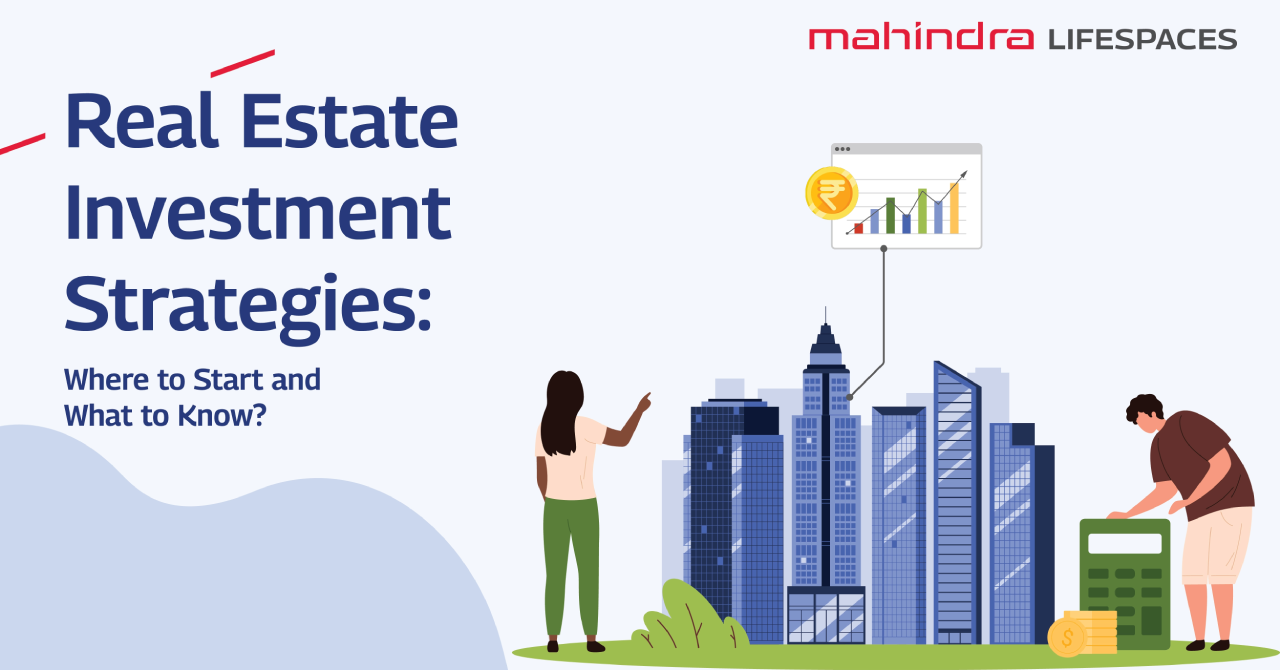Real Estate Investment Strategies: Where to Start and What to Know?

Real estate remains one of the most reliable ways to grow wealth steadily. Despite market ups and downs, many people turn to real estate investing to secure their financial future and achieve consistent returns.
Whether the goal is to generate rental income, expand investment portfolio, or protect capital, having a strong understanding of how to invest in real estate is essential. While the market evolves, the core approach stays the same: define the goals, choose the right property, and plan strategically for long-term success.
So, what makes the best real estate investments truly effective? Let’s delve into the timeless strategies and new-age shifts shaping today’s property investment landscape.
The Foundation of Real Estate Investment: What Doesn’t Change?
Before exploring modern trends or platforms, it’s worth grounding yourself in the basics. These key pillars serve as the starting point for anyone learning how to get started in real estate investing.
-
Location is Always King
If you’re serious about real estate investing, the location should always be your top priority. Properties surrounded with good infrastructure and are close to workplaces, schools, public transportation, are easier to rent out and tend to appreciate more over time.
It’s not just about present value; consider the area’s potential growth over the next five to ten years, and you’ll understand why this is one of the best real estate investments you can make.
-
Risk Assessment is a Must
Risk is an inherent part of every property investment and identifying it early can help in making more informed decisions. Real estate investing risks can stem from market fluctuations, long gestation periods, regulatory delays, and even tenant occupancy issues.
The choice between investing in land, commercial space, or developed property should be guided by capital availability, financial goals, and market understanding.
Commercial properties, while potentially more lucrative, often involve higher upfront investment and longer lock-in periods. On the other hand, land may appear promising but is prone to legal and zoning uncertainties.
A thorough risk analysis, including due diligence on legal clearances, local market demand, and infrastructure plans, plays a vital role in safeguarding investment outcomes.
Choosing between land plots, commercial & residential rental properties, or resale should depend on financial flexibility and appetite for market shifts. Understanding limits can help avoid unnecessary stress later.
-
Financing Smartly
Financial discipline plays a significant role in the success of a real estate investment. One of the most practical lessons in investing in real estate is learning to manage your finances effectively.
Realistic budgeting, responsible EMI planning, and access to affordable credit all contribute to long-term financial sustainability.
Lenders often evaluate a borrower’s credit score; a numerical representation of repayment behaviour, outstanding debts, and credit history.
A strong credit score enables access to better loan terms, including lower interest rates and higher approval chances. It also strengthens negotiating power during property transactions.
Pre-approval for financing can streamline the buying process and ensure readiness when the right opportunity arises.
A sound financial strategy for buying property lays the groundwork for scalable and secure investments.
-
Long-term Perspective Pays Off
Unlike stocks or mutual funds, real estate investing is a long game. Property values usually grow over time, and holding for five to ten years often results in better returns and more stable income.
This makes real estate ideal for people with long-term goals and patience to invest long-term.
Time-tested Real Estate Investment Strategies
No matter your experience level, these classic approaches continue to drive results. They’re especially useful if you’re figuring out how to get started in real estate investing.
-
Buy-and-hold (Rental Income)
Buy a home, rent it out, and earn monthly income; it’s a popular strategy that continues to work in both urban and emerging areas. Over time, the property also appreciates, giving you a twofold benefit.
The Indian Rental Housing market was valued at USD 20.3 billion in 2024 and is expected to reach USD 26.7 Billion by 2030 with a CAGR of 4.56% during the forecast period.
This remains one of the best real estate investment strategies for those looking for consistent returns without selling right away.
-
Land Investment
Purchasing plots of land in a developing location and holding it until the area matures is another reliable option. It doesn’t offer immediate income but can provide strong appreciation over time.
-
Commercial Real Estate
The commercial real estate segment is witnessing steady growth, particularly in metro cities where thriving business activity and infrastructure are creating strong demand.
As more companies expand and set up new workspaces, commercial properties such as office parks and retail units are gaining attention.
For those exploring real estate investing beyond residential projects, this segment offers rewarding opportunities. With long-term leases and consistent occupancy, commercial investment in property requires a strategic approach but often delivers dependable returns.
-
Rental Laddering and Upgrades
Many buyers are following a structured journey in their property ownership—starting with rentals, then transitioning to owning a 1–2 BHK home, and later upgrading to more spacious 3+ BHK homes.
This progression is a cautious way to begin real estate investing.
It allows individuals to understand market dynamics, build financial strength, and gradually scale their investments.
For anyone looking into how to get started in real estate investing, this laddered path provides clarity and confidence, with each step aligning to evolving lifestyle goals and income levels.
What’s Evolving: Trends To Keep in Mind
While the foundation of real estate investing remains firm, two new trends are shaping modern investor behaviour.
-
Rise of Green and Smart Properties
Homebuyers and renters alike are prioritising energy-efficient, eco-friendly homes. From lower electricity bills to better resale potential, sustainable housing is now part of the mainstream conversation.
According to a KPMG report, homebuyers are increasingly willing to pay a premium for sustainable features and green certifications for a housing project, indicating a positive impact on ROI.
As you plan how to invest in real estate, keep an eye on projects that are made for the future.
-
Shift Towards Digital Platforms
From virtual site tours to online documentation, digital platforms are simplifying the property buying process. Research, legal checks, and even booking a flat can now happen online.
This tech-first approach makes it easier to manage and expand your property portfolio, even remotely.
Technology is making it easier for more people to explore and enter the market. Digital tools like virtual tours, online booking, and remote verification are expanding access, especially for first-time and NRI investors who may not be physically present but still want to invest confidently.
Cities like Pune, Jaipur, and Bengaluru have seen increased adoption of these platforms, especially for premium and mid-segment developments. This tech-first approach supports those learning how to get started in real estate investing, offering greater flexibility and speed across the journey.
Ultimate Checklist for First-time Real Estate Investors
Just getting started? These tips can help you navigate your first few steps with confidence
-
Define Investment Goals
-
Decide if the focus is rental income, long-term value appreciation, or diversification
-
Choose between residential, commercial, or mixed-use investments
-
Set a timeline – short-term gains or long-term portfolio growth
-
-
Research Market Trends
-
Study city-specific trends in high-demand areas like Mumbai, Pune, Bengaluru, Jaipur, or Chennai
-
Track infrastructure developments that can improve ROI
-
Look into sustainable housing and green building trends
-
-
Evaluate Budget and Financing
-
Set a realistic budget including registration fees, stamp duty, taxes, etc.
-
Explore loan eligibility and compare interest rates
-
Account for ongoing costs like maintenance, insurance, and property tax
-
-
Legal Due Diligence
-
Ensure the project is RERA-registered
-
Verify land ownership titles and zoning permissions
-
Confirm there are no legal disputes or encumbrances
-
Review the developer’s past projects and delivery timelines
-
-
Choose Property Type Wisely
-
Start small—consider a 1BHK or a compact 2BHK to stay within manageable limits
-
Evaluate rental potential and resale value
-
Consider shared ownership or REITs if direct ownership feels overwhelming
-
-
Location & Builder Selection
-
Prioritise areas with growing infrastructure and job hubs
-
Research the builder’s reputation and track record
-
For NRI investors, choose developers who offer reliable remote coordination and digital access
-
-
Visit the Property or Take a Virtual Tour
-
Do a physical site visit or opt for a digital walkthrough
-
Observe surrounding amenities, traffic flow, and future development plans
-
Confirm the quality of construction and layout in person
-
-
Clarify Terms & Agreements
-
Carefully read the agreement for payment structure, delivery timelines, and penalty clauses
-
Ask for a breakdown of charges: GST, maintenance, registration, etc.
-
Consult a legal expert before signing anything
-
-
Plan for Exit Strategy
-
Set an expected holding period – 3, 5, or 10 years
-
Have a resale or rental plan in place
-
Monitor market trends regularly to decide when to sell or reinvest
-
-
Track and Scale
-
Start tracking property performance; appreciation, rental yield, and expenses
-
Reinvest earnings in future properties or upgrade to a larger unit
-
Continue learning through market updates, expert advice, and networking
-
Where Your Dreams Begin
Whether you’re a beginner or a seasoned property investor, the golden rules of real estate still hold true.
Choosing a good location, understanding risk, financing smartly, and thinking long term are the building blocks of success in the world of real estate investing.
At the same time, new opportunities like green buildings and digital tools for experiencing real estate properties, are changing how we approach investment.
If you’ve been wondering how to get started in real estate investing, you can contact our team at Mahindra Lifespaces to explore the best opportunities for your investment journey.
Real estate investing is as much about patience as it is about planning. Start smart and build strong.
FAQs
-
What is the best way to start investing in real estate?
Start by identifying your investment goals, like rental income, appreciation, or diversification. Research locations with growth potential and begin with a manageable property. Understand your budget, legal requirements, and financing options.
-
Is real estate investing suitable for first-time investors?
Yes, real estate investing is accessible to first-time investors.
Begin with clear goals and a realistic budget. Explore simpler options like fractional ownership or small rental properties. With the right research and planning, even beginners can build a strong foundation and gradually expand their portfolios.
Use our EMI & Budget Calculator to get a clear picture of finances and plan the first step into real estate investing with confidence. With the right tools and research, even first-time buyers can make informed decisions and start building a long-term investment portfolio.
-
How much money do I need to invest in property?
The amount needed for real estate investing depends on several factors. Key elements like the city, locality, size of the home, and included amenities all significantly affect the overall cost.
Premium developments with features like clubhouses, green spaces, and smart home tech often come at a different price point. It is also important to account for the down payment, registration fees, stamp duty, and other taxes.
-
What are the risks involved in property investment?
Investment in property requires careful risk assessment. Common risks include market fluctuations, low rental demand, legal disputes, and delayed project completion.
Like any financial decision, real estate investing comes with its considerations. Factors such as market fluctuations, rental demand, and timely project delivery can influence returns. However, with the right safeguards, these risks can be effectively managed.
In India, regulations like RERA (Real Estate Regulatory Authority) are in place to protect homebuyers and bring greater transparency to residential property transactions.
RERA ensures that projects are registered, legal titles are verified, and delivery timelines are upheld. For commercial properties, similar due diligence and structured agreements help reduce ambiguity.
-
Are green and smart homes good for investment?
Yes, green and smart properties are gaining popularity due to energy efficiency, reduced maintenance, and future-ready features. These homes often attract quality tenants and enjoy higher resale value. As sustainability becomes a priority, investing in such properties can enhance long-term returns while contributing to responsible living.
















